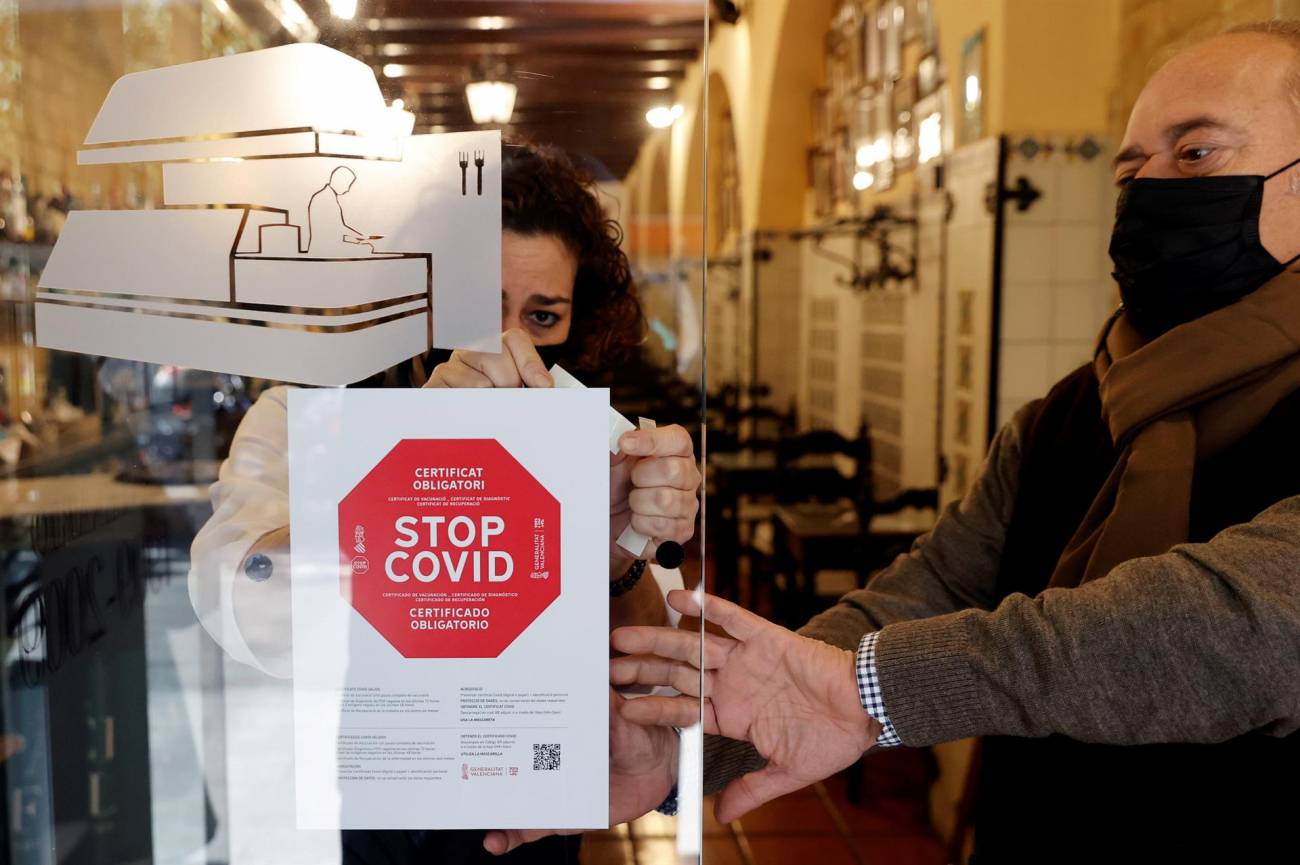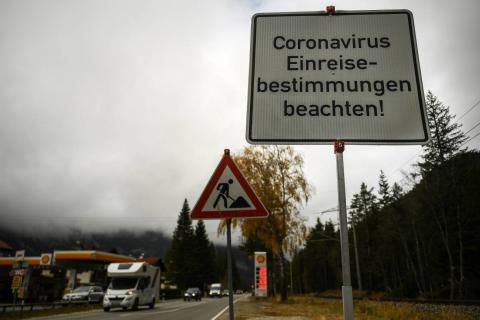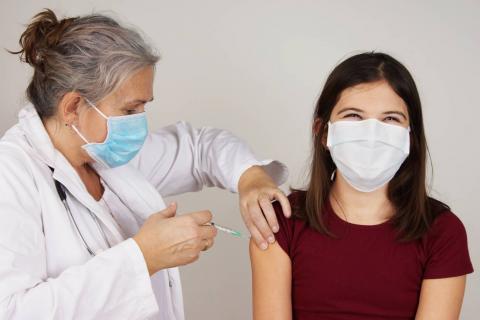How will we know if vaccines will resist omicron?
Sonia Zúñiga, virologist at the National Biotechnology Centre.
To find out, it is necessary to isolate the variant and test it against sera from patients who have been vaccinated or infected with the virus (ideally infected with different variants). In this way, the ability to neutralise the virus by the antibody response generated by the vaccines can be determined. To have data on efficacy, more time will be needed to see from epidemiological data, at the population level, whether the efficacy of the vaccines is maintained or has decreased.
Ignacio J. Molina, Professor of Immunology at the University of Granada.
The quickest way to find out whether or not there is resistance is to use serum from individuals immunised with the vaccines (with antibodies to the original variant, which is the one used as the immunogen) and test them with an omicron. This will tell us whether those antibodies have the capacity to neutralise the virus or not. If they neutralise it, that will suggest that the vaccines are likely to be effective. This needs to be corroborated by another, more complex, assay to measure cell-mediated immunity. We will also need epidemiological data, which will tell us whether vaccinated people become more infected with the new variant.
José Jiménez, researcher at King's College London.
The way to find out whether or not vaccines are resistant to omicron is to analyse their effectiveness in people vaccinated and infected with this new variant. In other words, we need to see whether vaccinated people become more infected, sick or die with this variant than with the previous ones, compared to unvaccinated people.
África González, Professor of Immunology at the University of Vigo.
We will need time. To compare vaccinated and unvaccinated people who become infected with the variant, according to the parameters: infections and serious illness (hospitalisation, ICU) and deaths.
Salvador Iborra, immunologist at the Complutense University of Madrid.
We need a reasonable amount of time to know how it spreads, whether it causes more or less pathology in the vaccinated population compared to the unvaccinated. This variant was detected on 24 November 2021 in South Africa, then in Botswana, Hong Kong, Belgium and Israel and finally appeared in several European countries and Canada (10.1016/j.ijid.2021.11.040). It should be recalled that the appearance of new variants of concern has occurred constantly and so far there is no evidence that vaccines are completely ineffective against them, but there is a certain loss of effectiveness, especially in the case of mild pathologies.
Matilde Cañelles, CSIC researcher.
There are two types of data used for this purpose: reinfection data and experimental data. Reinfection data will come out as the variant spreads and will include the numbers of people who have become infected despite being vaccinated, and the degree of severity of the disease in those people. Experimental data will be obtained by confronting the new variant with sera from vaccinated people and observing the extent to which the antibodies contained in these sera are able to neutralise the virus. These data will be compared with similar data from previous variants for comparison.
How long will it take to find out?
Sonia Zúñiga.
We still don't know how Omicron will behave with respect to vaccines. This is being studied in different laboratories around the world and we will probably have the answer in two or three weeks.
Ignacio J. Molina.
The antibody assay is relatively fast, we could have data in two or three weeks. The study of cellular immunity is a little slower, it may take a couple of months. The study of infectivity in humans needs even more time, probably around six months.
José Jiménez.
It will still take some time to find out (I can't say how long) because the omicron variant is still very much in the minority. To obtain reliable data we need to have a larger sample and for that to happen the omicron variant would have to displace, at least partially, the delta variant and this is something we don't know yet if it will happen. Much sooner we will have in vitro data on the neutralising power of the antibodies generated with the vaccines against this new variant.
África González.
The laboratory data may take a few weeks, as we already have sera from immunised people and they can be tested against the new variant.
Salvador Iborra.
By analogy with the delta variant, this was detected in December 2020 and the studies that showed a certain loss in vaccine efficacy arrived in the summer of 2021 (10.1056/NEJMoa2108891). In other words, it could take months. But everything will depend on how quickly the omicron variant spreads, which we do not know right now, and on how the pace of vaccination progresses in some countries. We should remember that in many African countries this process is going slowly.
Matilde Cañelles.
Experimental data are usually obtained in about two weeks. If we assume that they started as soon as the variant was detected, I would say that by next week we will have the first data. Re-infection data will take longer, as it will have to be observed in each country. We cannot deduce what is going to happen in Europe based on the data from South Africa, because the percentage of vaccinated population there is much lower. We will be able to get an idea when data from the UK and countries with similar vaccination levels start to come out.
How should we interpret the first data obtained in the laboratory?
José Jiménez.
These data will be important and will indicate whether or not this new variant has the potential to evade, at least partially, the antibody response. However, if this happens, it does not mean that the same thing will happen in people because we cannot forget that the immune response is much more than just the generation of antibodies.
África González.
In vitro data are not completely extrapolable to reality. The immune system is very complex. I show it as an army of different soldiers (ready-made sentries, with different weapons, and also elite soldiers). In laboratories, only total antibodies and neutralising antibodies are usually studied (in few laboratories, as the original virus or similar pseudoviruses are required). The fact that antibodies somewhat diminish the recognition of a new variant does not always have to be directly reflected in the reality of infected people, as we are not seeing the action of the other "soldiers". Moreover, when we see the new virus, our immune system also learns anew. Therefore, the only real evidence will be to see how effective it is in preventing serious illness, hospitalisations and deaths in people. For that, epidemiological data will be key.
From a theoretical point of view, what can we expect with the data available today?
Sonia Zúñiga.
The variant is worrying because it contains a larger number of mutations in the spicule protein and, in addition, many of them are concentrated in the cell receptor binding site. So, at least theoretically, it is possible that the properties of the virus could have changed in terms of its entry into cells (which could impact on its ability to transmit) and in terms of the ability of antibodies to block infection (which could impact on the effectiveness of antibody treatments or vaccines). In any case, in biology it is not easy to predict the effect of so many combined changes and we have to wait for experimental results.
Ignacio J. Molina.
The data are still very scarce and do not allow us to speculate on what might happen. It is likely, as has happened with other variants, that the neutralising capacity of existing vaccines is lower. But it is possible that this lower neutralising capacity is still more than enough to protect us from developing a serious disease. This is what has happened, for example, with the delta variant.
José Jiménez.
With the data we have today it is difficult to say anything because they are very few, the samples are very small and not very representative. We have to take into account that for the moment, most of the infected people have been identified in Africa, where the percentage of the vaccinated population is low compared to other places.
África González.
The immune system has already seen a "picture of the enemy" from the vaccine and the infection, and even if it changes, it will continue to recognise it. Vaccines will continue to be quite effective for several reasons: coronavirus variants do not change so drastically to lose all immunity, omicron has mutations shared with other variants (beta, delta...) and vaccines were still effective against them, although initially laboratory data showed that there could be a significant decrease in protection, which was not reflected in the clinic, especially for severe disease. In addition, our immune system is able to adapt to new variants: our antibodies also mutate and those that best recognise the new variants are selected.
Salvador Iborra.
Doubts about whether Omicron will be able to resist vaccines are based on an accumulation of mutations, changes in the structure of the S protein that would prevent it from being recognised by neutralising antibodies. Right now, however, we know far more about what we don't know than what we do know. And let's remember that covid-19 vaccines do not only protect by generating neutralising antibodies, they also generate T-lymphocytes capable of fighting the virus, which are less sensitive to the appearance of mutations.
If the worst case scenario comes true, what should be done?
Sonia Zúñiga.
In the worst-case scenario, that is, if the efficiency of the vaccines were to decrease a lot, any of the vaccines being administered could be updated quickly, which would take about two or three months.
Ignacio J. Molina.
Changing the immunogen in messenger RNA vaccines is a very fast process, and it would be ready in about three months. In fact, the contract for the extension of the vaccine order signed by the European Union and the pharmaceutical companies a few months ago specifies that in case of need, the new versions of vaccines should be ready within 100 days.
José Jiménez.
The worst prognosis is that this new variant will be more transmissible than the more virulent and vaccine-resistant delta variant. If this happens, what would have to be done is to update the current vaccines to introduce the mutations that Omicron has in the spicule protein. Theoretically this is a very easy procedure to carry out (a couple of weeks), but to this we have to add the whole process of large-scale production, so I imagine that all together it will take about two or three months. However, we cannot forget that the omicron variant has 32 mutations in the spicule protein. For this reason, it is possible that some testing may also be needed to assess the safety of the updated vaccine before it is commercialised on a large scale.
África González.
For now, the best we can do is to vaccinate all those over 18 who have not yet been vaccinated, send vaccines to developing countries and help with logistics so that they can vaccinate the most vulnerable people, in order to prevent the development of new variants. This global vaccination could be done within weeks, as vaccines are available. However, this is not happening. It is a pain that vaccines are expiring and being thrown away in rich countries when they can save lives. It is the cheapest and most effective procedure we have.
Salvador Iborra.
In the worst case scenario, if the vaccines completely lose their efficacy, they could be modified to adapt to this new variant. The generation of these vaccines is based on genetic engineering techniques and modifying the sequence that codes for the S protein in the different vaccines authorised by the EMA would be relatively simple. The problem would probably be more logistical, in terms of subsequent production. The deadline established by some companies to deliver doses with the vaccine adapted to the new variant is around 100 days.
Matilde Cañelles.
If the trend in South Africa is confirmed and the same intensity is maintained in other geographical areas, we will have to generalise booster doses to a wider segment of the population and vaccinate children as soon as possible.




